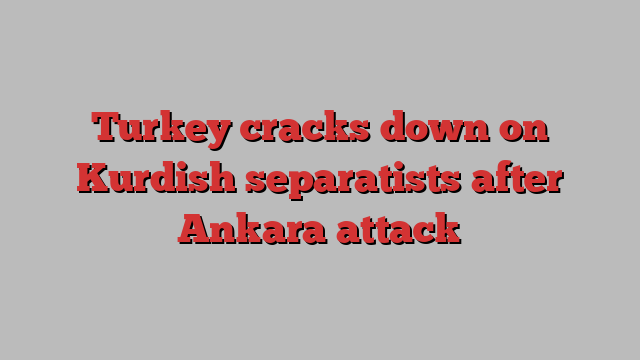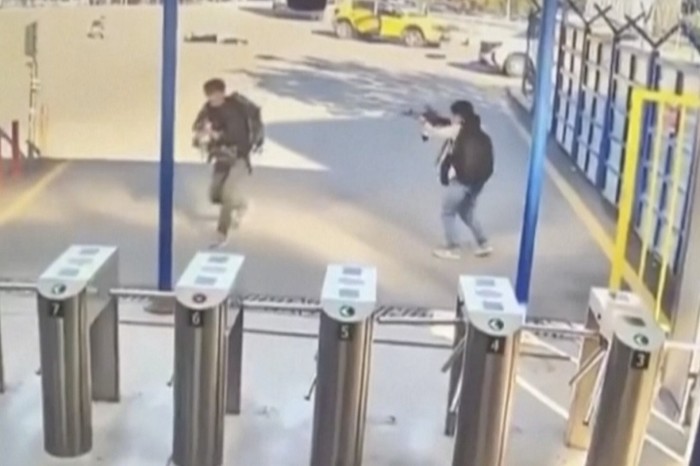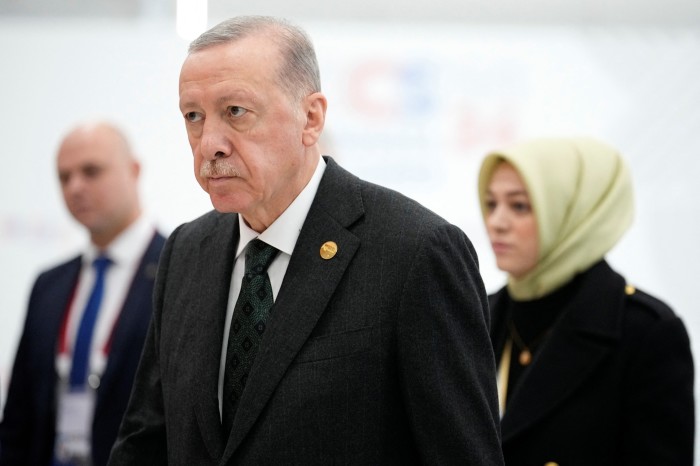
Unlock the Editor’s Digest for free
Roula Khalaf, Editor of the FT, selects her favourite stories in this weekly newsletter.
Turkey has intensified its crackdown on the Kurdistan Workers’ party as the separatist group claimed responsibility for a deadly attack on a state aerospace company this week.
The PKK, an armed militant organisation that has waged a four-decade long insurgency in Turkey, said on Friday that its “Immortals Battalion” had carried out Wednesday’s attack on a sprawling Turkish Aerospace Industries industrial site in Ankara, according to ANF News, which has close ties to the group.
Turkish authorities have launched scores of domestic and cross-border operations in the wake of the attack, in which two militants — a man and a woman — armed with assault rifles and explosives killed five people and wounded 22.
Police detained 176 people allegedly linked to the PKK across 31 provinces, the interior ministry said on Friday. One alleged PKK militant who had been on Turkey’s “most wanted” list was also “neutralised” in a clash in Mardin, a province on Turkey’s border with Syria.

Defence forces launched another round of air raids in northern Iraq overnight on Thursday, part of a series of operations that have targeted caves, shelters, bunkers and warehouses they said were linked to the PKK.
Separately, Turkey’s National Intelligence Organization struck 120 sites belonging to the PKK and affiliated groups, state media said.
“The terrorists were made to pay a very heavy price with these operations,” President Recep Tayyip Erdoğan told local media in remarks that were published on Friday.
Erdoğan added that the assailants in Wednesday’s attack had “infiltrated” Turkey through Syria as he vowed to “continue our policy of eliminating terrorism at its source”.

The PKK said it targeted the TAI facility because it produces weaponry that it alleged had killed civilians in areas with large Kurdish populations in Turkey’s south-east and northern Iraq and Syria. The 4mn square-metre plant produces everything from drones to jets, as well as satellites and helicopters.
The PKK is based in a mountainous region in northern Iraq, with an affiliated group known as the People’s Protection Units (YPG) operating in Syria.
The Syrian Democratic Forces (SDF), a Kurdish force dominated by the YPG, said on Thursday that Turkey’s raids in Syria had killed 12 civilians, including two children. The SDF is backed by the US to help fight Isis in Syria.
Turkey has launched a barrage of air raids and special forces operations against the PKK and its affiliates in recent years as it seeks to push them further away from its borders.
More than 600 civilians have been killed in Turkey and northern Iraq since peace talks between Ankara and the PKK collapsed in 2015, according to the International Crisis Group.
The PKK’s claim of responsibility could undermine recent speculation about a potential fresh set of peace talks. Prior to Wednesday’s attack, Erdoğan’s far-right ally Devlet Bahçeli had said jailed PKK leader Abdullah Öcalan may be given a chance at parole if he would agree to disband the group and halt its operations.
The PKK said on Friday that its attack had “absolutely nothing to do with the political agenda discussed in Turkey in the last month”. It described the Immortals Battalion, which was also behind a suicide bombing last year on a government building in Ankara, as “autonomous”.
Öcalan, through a nephew who visited him at an Istanbul island prison this week, indicated that he had the “power to move this process from the grounds of conflict and violence to the legal and political grounds if the conditions arise”.